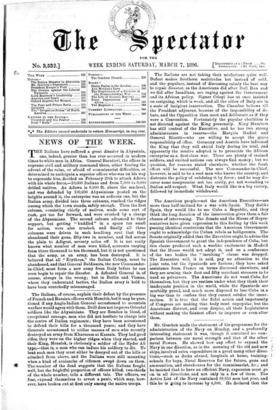The Italians are not taking their misfortune quite well. Defeat
makes Southern multitudes hot instead of cold, and the populace, instead of discussing calmly the beat way to repair disaster, as the Americans did after Bull Run and we dtd after Isandlana, are raging against the Government and its African policy. Signor Crispi has at once insisted on resigning, which is weak, and all the cities of Italy are in a state of incipient insurrection. The Chamber bellows till the President adjourns, because of the impossibility of de- bate, and the Opposition then meet and deliberate as if they were a Convention. Fortunately the popular ebullition is not directed against the King personally. King Humbert has still control of the Executive, and he has two strong administrators in reserve—the Marquis Radini and General Rieotti—who are willing to accept the grave responsibility of office. Germany and Austria have informed the King that they will shield Italy during its trial, and apparently the resolve adopted is to prosecute the African enterprise as a first-class war. There are plenty of trained soldiers, and excited nations can always find money ; but we question, for reasons stated elsewhere, whether the fresh effort will be successful. The new Commander-in-Chief, however, is said to be a cool man who knows the country, awl distrusts the policy of subduing it by force ; and he may dis- cover some compromise not too costly, yet not wounding to Italian self-respect. What Italy would like is a big victory, followed by immediate withdrawal.






































